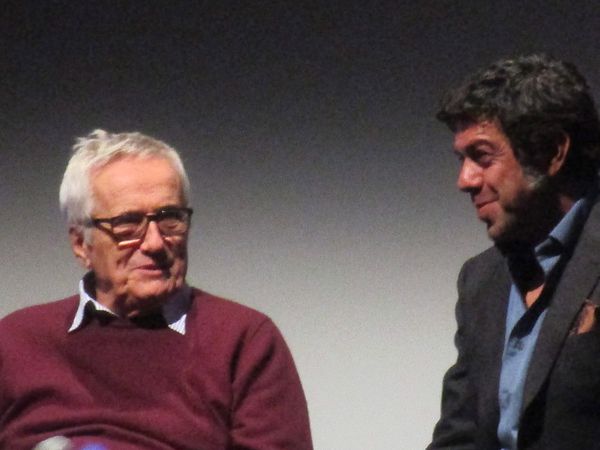 |
| Marco Bellocchio with Pierfrancesco Favino on The Traitor (Il Traditore): “The whole world is really tied together by the moon.” |
Marco Bellocchio’s The Traitor (Il Traditore), co-written with Valia Santella, Ludovica Rampoldi, Francesco Piccolo, and Francesco La Licata, shot by Vladan Radovic (Ginevra Elkann’s If Only, Gianni Zanasi’s Lucia's Grace, Laura Bispuri’s Daughter Of Mine and Sworn Virgin) is a film of breathtaking beauty with costumes by Daria Calvelli (Sweet Dreams, Blood Of My Blood). Pierfrancesco Favino gives a career-defining performance in his portrayal of real-life Mafia boss Tommaso Buscetta.
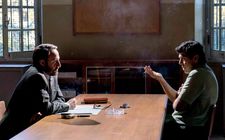 |
| Judge Falcone (Fausto Russo Alesi) with Tommaso Buscetta (Pierfrancesco Favino) |
There is nothing alluring about the lifestyle of his family, when Marco Bellocchio takes it on, because the director never lets us forget the threat of violence, lurking around every corner, in every scene. A count-up warns of assassinations to come and music soothes and heightens, in a way only Bellocchio knows how to combine.
Buscetta, after his extradition from exile in Brazil in the Eighties, and the murderous rampage by rivalling factions of his family members, decided to work together with Judge Falcone (Fausto Russo Alesi), who is the real hero here. Buscetta's testimony and the famous Maxi Trial changed Italy for good. The extravagant party at the start, celebrating traditionally Santa Rosalia in Palermo in 1980, might make you think of Visconti's The Leopard in its splendour, but not for long.
Anne-Katrin Titze: The courtrooms are the real courtrooms where you were filming, weren't they?
Marco Bellocchio: Yes.
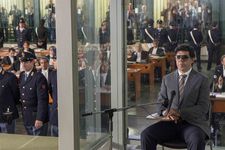 |
| Pierfrancesco Favino as Tommaso Buscetta in the courtroom where the Maxi Trial took place |
AKT: And you added cuts to animal cages into this very real courtroom drama. The hyena, the lion, and rats at another point - it felt to me as though you were saying that nature is also always there. This is some of the worst that humans are doing to each other. Then here is also the beautiful nature in Rio and the animals in cages.
MB: All the animals you see are animals in cages. So at that moment when he [Tommaso Buscetta] is asking about Calò [Fabrizio Ferracane] he remembers the time of a visit to the zoo in Palermo where they saw this tiger in a cage. When Totò Riina [Nicola Calì] is about to be arrested, there's an image of a hyena which is almost cadaveric.
The rats [not with the English connotation of informant] represent more the rats escaping the ship. It's the Mafia when they are about to be indicted and imprisoned, these are the rats that are all fleeing. Thousands. But this other image, where nature invades the scene, we really see nature in its fullness. That scene where the wife is dangled from the helicopter at the same time as we are seeing all this natural beauty of Rio.
 |
| Marco Bellocchio on Tommaso Buscetta (Pierfrancesco Favino): “He identifies with the old Mafia which he sees as respecting certain principles …” |
AKT: The ominous singing Santa Claus, the scenes in the US, the supermarket where Buscetta does the gun shopping - it shows that he can never relax. There isn't a moment where he doesn't suspect a gun behind the door.
MB: Yes, one of the things that he told [Judge] Falcone [Fausto Russo Alesi] was that his one desire was to die in his own bed, because he was always afraid of an attempt being made. Knowing that the Mafia doesn't forgive and the Mafia doesn't forget.
He was always afraid of an attempt being made on his life, of being betrayed. In fact, even when he himself is dying from cancer, you see that scene of him sitting on the terrace but with a rifle right by him.
AKT: And the Santa Claus?
MB: That scene that takes place in the restaurant with the Santa Claus, I don't know if that's clear to an American audience or not. Because the song that this character is singing ends in the Italian original - it's such a well-known song [L'italiano (Lasciatemi cantare) - with "sono un italiano", "I am an Italian". But the Santa Claus changes the word from "I am an Italian" to "I am a Sicilian". Which makes Buscetta afraid that this is a threat and leads him to leave the restaurant.
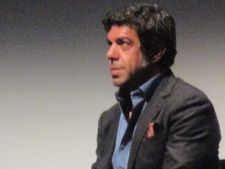 |
| The Traitor (Il Traditore) star Pierfrancesco Favino at the 57th New York Film Festival Photo: Anne-Katrin Titze |
AKT: Right. I got that.
MB: Did you know the song?
AKT: Yes, I remember hearing it on the radio growing up.
MB: It's very famous in Italy.
AKT: "The old noble Mafia is a myth" is a quote.
MB: Yes, the noble Mafia is a myth. Buscetta kind of defends himself by drawing this contrast between the ancient Mafia and the Mafia. He identifies with the old Mafia which he sees as respecting certain principles - no harm should be done to children, to women, to judges. Whereas the new Mafia has no principles.
And Judge Falcone in that one scene contradicts him very vigorously, saying no, the old Mafia committed horrible crimes. Buscetta is doing this to defend his own image, to justify his actions.
AKT: You are using the famous chorus from Verdi's Nabucco during the Maxi Trial, at the sentencing, which is perfect.
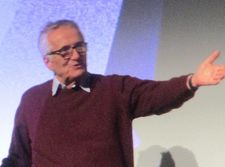 |
| Marco Bellocchio on using Verdi's Nabucco during the Maxi Trial sentencing: “That chorus ‘Va, pensiero’ in Italy is almost a folk national anthem.” Photo: Anne-Katrin Titze |
MB: That chorus "Va, pensiero" in Italy is almost a folk national anthem. By using it at that moment of the sentencing, it's as if to say this is a victory not only for Sicily, but for all of Italy. And I think that it underlines this particular moment, giving it a national value and a power that is tied to the beauty of that music itself.
AKT: My last question is about the moon. In the shape of an egg, not completely full. Is there a symbolic reference that I didn't get?
MB: No, I wasn't interested in that particular phase of the moon, but I wanted to tie together these two moons, the moon of Miami at this moment when he is dying and the moon over Sicily that night. And the whole world is really tied together by the moon.
So I was interested in this image of the moon from many years ago when the victim who finally felt that he was free from the threat of being killed, was killed by, of all people, Buscetta, some 20 years later, sort of in fulfilment of that Italian saying "The Mafia knows how to wait."
Read what Marco Bellocchio had to say on the American tradition of Francis Ford Coppola and Martin Scorsese and the true characters and events in The Traitor.
The Traitor (Italy’s Oscar submission) opens in the US at Film Forum and Film at Lincoln Center on January 31.





















